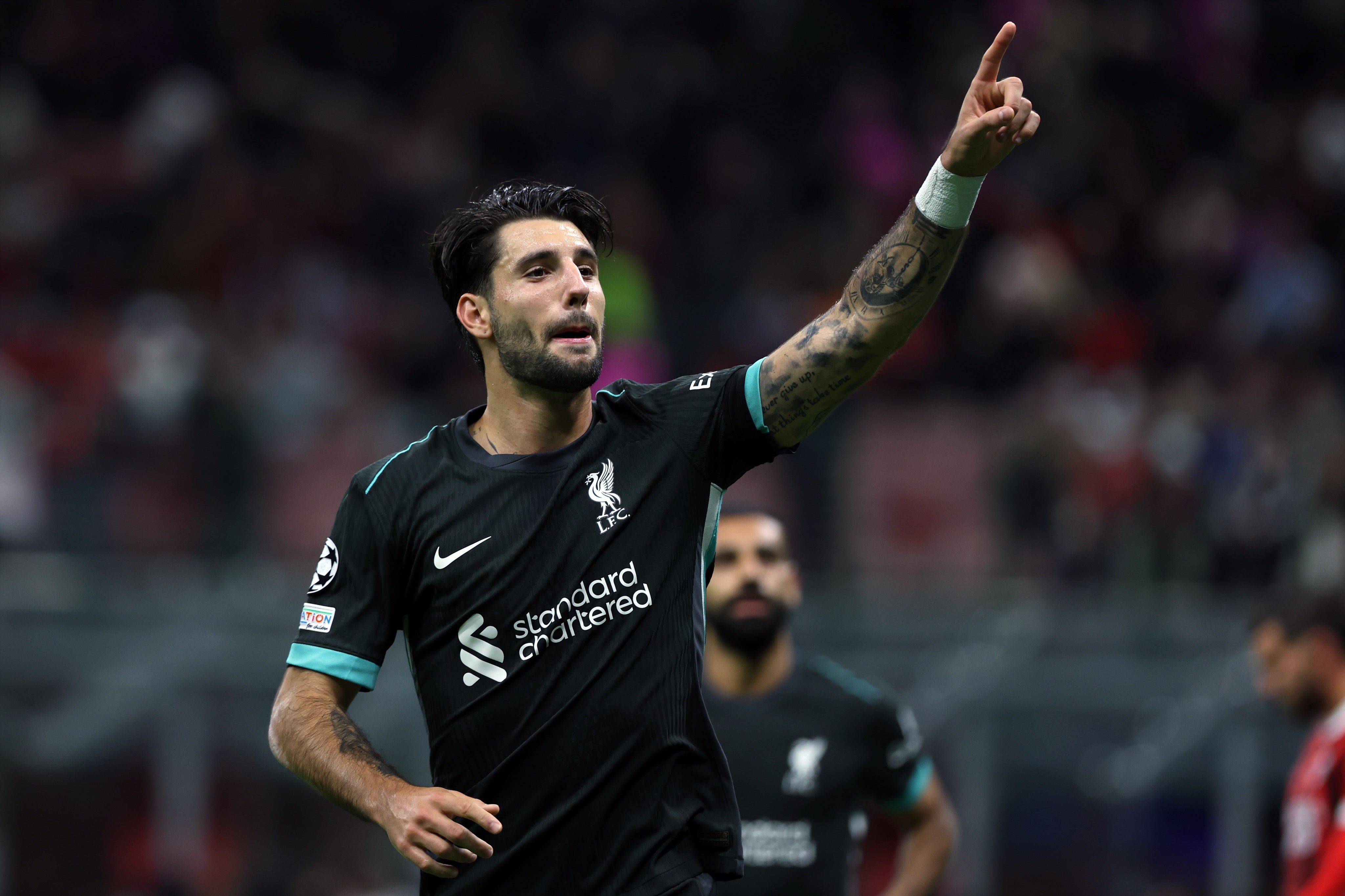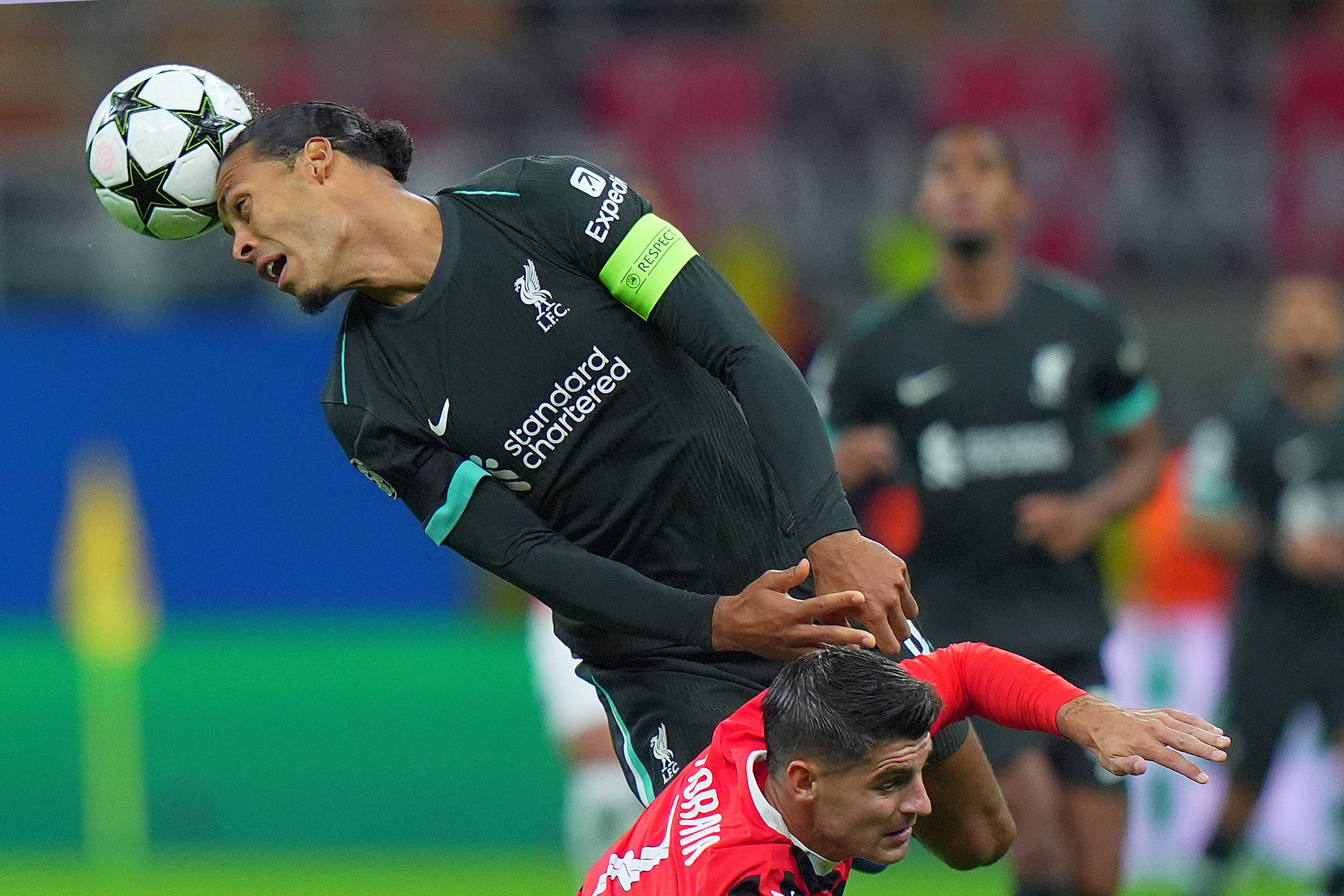Arne Slot overcomes significant hurdle with Liverpool against AC Milan to lay down Champions League marker
AC Milan 1-3 Liverpool: Liverpool scored three goals and showed their skill and determination at the San Siro

Your support helps us to tell the story
From reproductive rights to climate change to Big Tech, The Independent is on the ground when the story is developing. Whether it's investigating the financials of Elon Musk's pro-Trump PAC or producing our latest documentary, 'The A Word', which shines a light on the American women fighting for reproductive rights, we know how important it is to parse out the facts from the messaging.
At such a critical moment in US history, we need reporters on the ground. Your donation allows us to keep sending journalists to speak to both sides of the story.
The Independent is trusted by Americans across the entire political spectrum. And unlike many other quality news outlets, we choose not to lock Americans out of our reporting and analysis with paywalls. We believe quality journalism should be available to everyone, paid for by those who can afford it.
Your support makes all the difference.Another first for Arne Slot at Liverpool, and one that was much more significant than a debut win in this new Champions League. This emphatic 3-1 victory over Milan was the first time his team have come from behind.
That is more impressive and important than it sounds, given the concerns that could have been allowed to spread from Saturday’s 1-0 defeat to Nottingham Forest, and then Christian Pulisic scoring within three minutes of this Champions League season starting. Rather than new concerns, though, Liverpool just gave themselves new confidence.
They used this great football arena to display many more elements to their attack, while showing a resolve in a way that is perhaps important early on in this new regime. Even beyond what a second successive defeat might have done for Slot, a second game where they struggled when going behind would have been even worse.
Liverpool instead gave maybe their best display so far. That’s even in the context of how disappointing Milan were. You could see why Paulo Fonseca is under such pressure, not least for the side’s apparent negligence at set-pieces. The team were loudly whistled off at the end.
You could also see how Slot himself solves problems as games go on. There were about four minutes when it looked like Saturday’s setback could develop into a more serious problem. Just like Nottingham Forest late in that game, Milan were shredding Liverpool with pace early in this one.
Rafael Leao immediately scorched down the left to force Virgil van Dijk into a six-yard box clearance in the first move of the game. Pulisic then did the same down the other flank to go one better. He really just ran straight through, before then finding the inside of the net with an even cleaner angle.
It was a fine goal, and really Pulisic at his best. His directness is so useful for the right approach. The problem here was that that isn’t necessarily the right approach for an entire game against Liverpool. Even Nuno Espirito Santo only used it late on at Anfield on Saturday.
The concern here for Slot might have been more psychological than tactical, as the goal could have allowed doubts to build. None were evident. Liverpool immediately began constructing attacks in the way the manager would idealise. There was some fine passing build-up play, with the resurgent Cody Gakpo then repeatedly breaking the lines.
That points to another growing but noticeable element of Slot’s time so far. His Dutch players have all enjoyed leaps in form. Just behind Gakpo, Ryan Gravenberch has looked a totally different player. He was here commanding midfield and so often cutting out those Milan breaks, before helping to build moves.
The only surprise was that the goals came from set-pieces rather than that sort of surging play, but then maybe “surprise” is overstating it given how poor Milan were in such situations. Ange Postecoglou could reasonably look at this match and wonder why the same fuss isn’t made about this great Italian club with such defending.

On 23 minutes, Ibrahima Konate barely had to jump to nod in Trent Alexander-Arnold’s delivery. On 41 minutes, it seemed Van Dijk was actually just standing there as he headed in.
Liverpool had been at their most rampant in between, with Mike Maignan forced into two big saves and Mohamed Salah smashing the crossbar.
There was eventually a tangible reward for that kind of play through the goal of the game. On 67 minutes, after an elegantly angled passing move that turned containment into a counter within seconds, Gakpo was again released. He played the most inviting cross for Dominik Szoboszlai to easily score. By that point, in the 67th minute, Kostas Tsimikas had more shots than the home side.
There remains such an incongruity between what the San Siro is as a grand football stage and what Milan are as a team. One no longer fits the other, something that has a bit of an ironic twist given that the club have been looking to leave the stadium for something new. It wasn’t the only relationship that has been inverted here. Milan had six former Premier League players in their line, with five of them coming from Chelsea. This has naturally been a cause of great excitement, due to the international obsession with the Premier League. It is just curious for those who remember the mid-1990s, when there was such an English admiration for Serie A that Nottingham Forest’s signing of Andrea Silenzi from Torino was greeted as a landmark moment. Wow, an Italian playing in England. Liverpool have just signed their own Italian, with former Juventus star Federico Chiesa coming on to make his debut, to a soundtrack of boos from former rivals.
Other parts of the night’s soundtrack seemed to show Milan don’t want you to forget the 90s anyway. The old stands reverberated to the sound of hits from the decade, including “Rhythm is a Dancer” and a dance version of “Song 2”. It was just striking that there wasn’t much “Freed from Desire”.
There are obvious lines about living in the past, all as Milan’s private equity hierarchy represent one of the most modern forms of club ownership there is. That also points to where the club are, though.
This wasn’t exactly Milan-Liverpool as Uefa, the European Club Association and various other interests would have imagined it for most of modern football history. Such politico-economic questions are going to be an issue for this new Champions League going forward.
It was an attack, at least, close to what Slot would have imagined.



Join our commenting forum
Join thought-provoking conversations, follow other Independent readers and see their replies
Comments